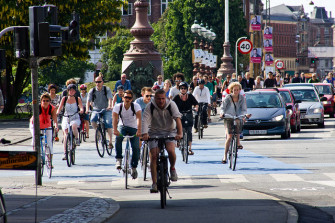
6 Billion Euros for a World You Like
6 Billion Euros for a World You Like
Money makes the world go round. With EU budget negotiations coming to an end, here’s a guide on how you can help your local and national politicians unlock €6 billion of funds for cycling over the next seven years – a handy introduction to the EU budget included.
After hard and extremely complicated negotiations that started back in 2011, the three main EU institutions – Commission, Parliament and Council of the EU – finally reached a compromise on the EU budget this summer.
 But now the question is, just how much of the money will go into sustainable transport and climate-saving mobility solutions? Or to put it more simply, how much money will the EU and the member states spend on… a world you like, with a climate you like? After all, cycling is one of the most efficient solutions to start saving CO2, right here and right now.
But now the question is, just how much of the money will go into sustainable transport and climate-saving mobility solutions? Or to put it more simply, how much money will the EU and the member states spend on… a world you like, with a climate you like? After all, cycling is one of the most efficient solutions to start saving CO2, right here and right now.
In EU-speak, the budget is called “Multiannual Financial Framework.” That’s because the EU adopts a budget for seven years in a row – this time, for the period from 2014 to 2020. The total amount of the EU budget is therefore impressive. Together with the member states, the EU will spend over €1000 billion, or €1 trillion, over the next seven years.
Making the most of the EU budget
That’s where ECF’s €6 billion campaign comes into play. ECF estimates that over the last seven-year period, only €600 million from EU funds have been used on cycling, and out of these, €400 million have been spent in only four countries – Hungary, Germany, Poland and the Czech Republic. That only leaves €200 million to the whole rest of the EU, or 0,02 percent of the total budget.
Yet, the budget is also called a “framework” - because the decisions on how the funds are going to be used have not yet been taken in detail. Some financing will be come directly from the EU, but many funds will be spent by member states and regional authorities in cooperation with the European institutions and agencies.
Given the €1 trillion budget the EU is currently finalizing, and considering that most decisions on how to spend it are still to be taken, it’s hard to argue that there couldn’t be more money to be allocated to cycling. Funding for cycling projects could come from the EU Cohesion Policy, for instance, as well as the Rural Development Fund and Funds for Neighboring Countries.
Policy makers need to know what to ask for first
Yet local authorities and politicians need to be aware that these funds can indeed be used to promote sustainable transport and cycling, as Hungary’s example shows. If one single country can get €100 million in EU funds for its national cycling plan, as Hungary did, others can get the same or even more. ECF wants to unlock €6 billion for cycling this way.
In order to help you and the cycling advocacy organizations in your country to free up funds for cycling, ECF has launched the €6 billion campaign, put together a guide and put it online in order to help local decision makers to know better what to ask for.
Check out ECF's guide on how to get €6 billion of funding for cycling from the EU over the next seven years.
In fact, regional authorities have to put together and adopt so-called Operational Programmes that determine how the EU funds are finally spent. That’s the moment where cycling advocates can make a difference and convince the relevant authority to include funding for cycling in their plans.
Arguments that can be used in order to convince them are the economic benefits of cycling, the importance of the cycling industry and cycling tourism, CO2 savings through cycling as well as health benefits.
Once again, the solutions – and even the money to apply them – are right in front of you. Let’s make sure local authorities and politicians are going to spend it on a world you like.
Topics:
- Log in to post comments
Contact the author
Recent news!
Upcoming events
Contact Us
Avenue des Arts, 7-8
Postal address: Rue de la Charité, 22
1210 Brussels, Belgium










